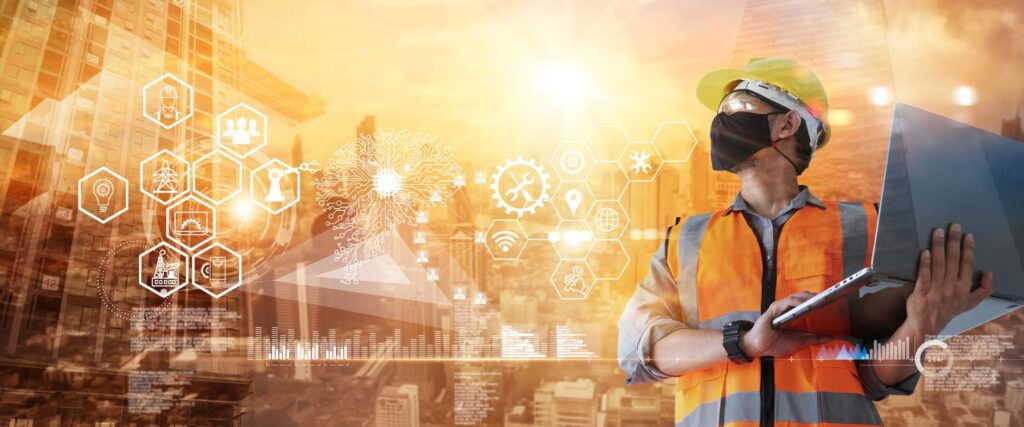Transforming Construction Landscape: Synergizing AI, Automation, and Custom Software Solutions

In an era driven by technological advancements, the construction industry is experiencing a transformative phase where Artificial Intelligence (AI) and automation are redefining operational dynamics.
The fusion of these technologies through custom software solutions is not just a technological upgrade; it is a revolutionary step towards optimising construction processes, enabling precision, efficiency, and innovation. This article aims to elucidate the transformative role and synergistic impact of integrated software solutions in construction, providing a blueprint for the industry’s future.
The Nexus Between AI, Automation, and Custom Software in Construction
- AI, automation, and custom software form a symbiotic alliance, crafting comprehensive and bespoke solutions that cater to the multifaceted demands of construction projects.
- A seamless amalgamation of these technologies addresses industry challenges holistically, offering a robust and unified platform for optimal construction management.
- Tailored software solutions embedded with AI and automation ensure precision and adaptability, aligning with the unique prerequisites and complexities of the construction sector.
Identifying Construction Industry Pain Points
- Inefficiencies and Delays: Time-consuming processes and inaccuracies can lead to project delays and inflated costs.
- Resource Mismanagement: Inadequate allocation and utilisation of resources often result in operational bottlenecks and project overruns.
- Cost Overruns: Unforeseen expenses and inaccurate cost estimations can escalate project budgets.
Custom Software Solutions for Construction: A highly aligned integration of AI and automation
Custom software serves as a harmonious conduit for integrating AI and automation, providing balanced and cohesive solutions that revolutionise construction procedures.
A. Streamlined Project Management
- Enhanced Planning and Scheduling: Custom solutions enable dynamic and efficient planning, ensuring meticulous scheduling and timely implementation.
- Quality Assurance: Embedded AI and automation ensure stringent quality control, maintaining high standards throughout the project lifecycle.
- Real-time Monitoring: Seamless tracking and monitoring of project progress, providing insights and enabling prompt interventions.
B. Accurate Cost Estimation and Resource Allocation
- Precision in Budgeting: Custom solutions, leveraging AI, offer precise budget estimations, mitigating the risk of cost overruns.
- Optimised Resource Distribution: Intelligent allocation and utilisation of resources, minimising waste and enhancing productivity.
- Financial Forecasting: Proactive financial management through predictive analytics, ensuring economic stability and sustainability.
C. Predictive Analysis and Risk Management
- Proactive Risk Identification: Early detection of potential risks, enabling the formulation of mitigation strategies.
- Safety Enhancement: Automation and AI facilitate stringent safety measures, reducing accidents and ensuring a secure working environment.
- Decision Support: Integrated solutions provide insightful data and in-depth analytics, aiding in informed and effective decision-making.
D. Enhanced Communication and Collaboration
- Unified Communication Platform: Custom software fosters seamless communication among stakeholders, enhancing collaboration and information exchange.
- Document Management: Efficient and secure management of essential documents, ensuring accessibility and reducing information loss.
- Stakeholder Engagement: Strengthened relationships with stakeholders through transparent and efficient information dissemination.
E. Sustainability and Environmental Consideration
- Sustainable Construction Practices: Implementation of eco-friendly practices and materials, contributing to environmental preservation.
- Energy Efficiency: Utilisation of advanced technologies to optimise energy consumption, reducing carbon footprint.
- Compliance Management: Ensuring adherence to environmental guidelines, regulations and standards, mitigating legal and reputational risks.
F. Scalability and Flexibility
- Adaptive Solutions: Custom software solutions are scalable and flexible, adapting to project evolutions and expansions.
- Future Integration: Readiness for integration with upcoming technologies, ensuring the project stays ahead of the curve.
- Customisation: Ability to tailor solutions to the unique needs and changes of the project, providing a perfect fit.
The above-mentioned use cases are the bare minimum for most organisations in the construction industry. You can utilise these benefits just by having very basic AI-enabled software for your business. The spectrum of benefits of custom software is very broad.
The Road Ahead: Future Trends and Developments
Advancements in the synergy of AI, automation, and custom software are leading to the evolution of more sophisticated and integrative solutions, redefining industry standards and pushing the boundaries of construction capabilities.
The integration of AI, automations, and custom software solutions is a revolutionary stride, transforming challenges into innovation opportunities and setting the stage for a new construction era marked by cohesion and sustainability.
If you are a Construction companies, planning on an integrated custom software solution for your business to transform your operational landscape, get in touch with us today.
